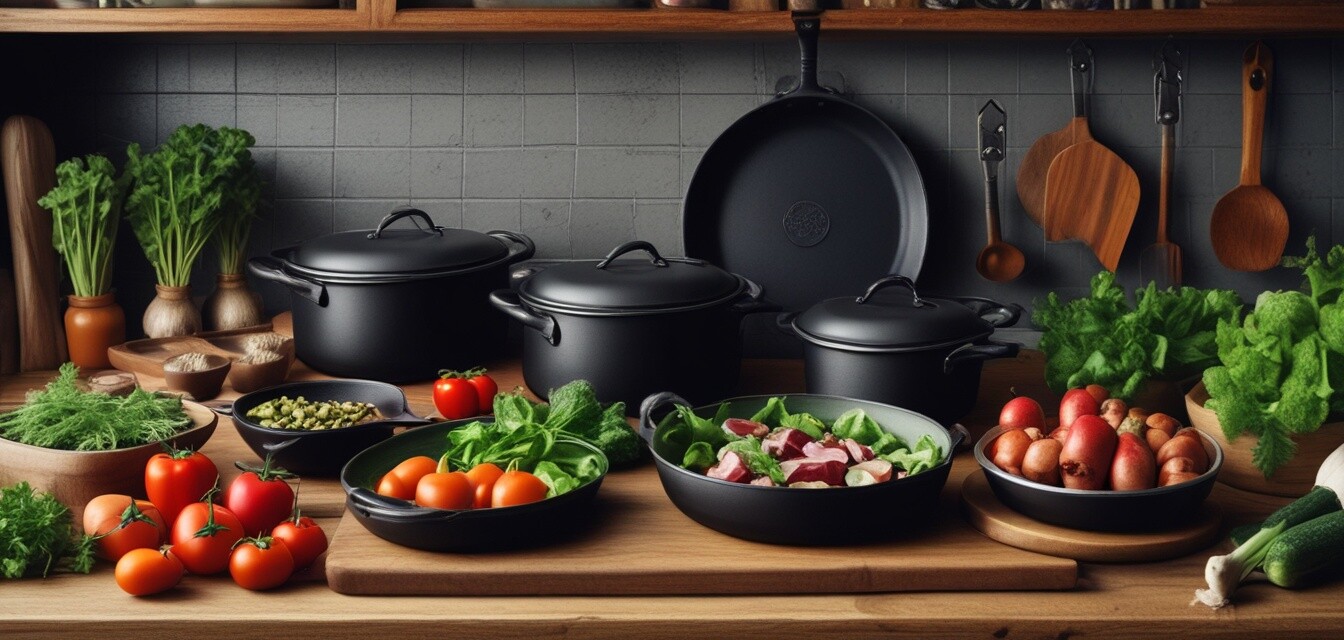
Disclosure: The FTC requires that this article indicate that it was created using AI and is not based on personal experience. It includes affiliate links, which means we may earn a commission if you purchase through these links at no extra cost to you. As Amazon Associates, we earn from qualifying purchases. Product recommendations and endorsements were generated by AI and do not reflect personal opinions or real-world use.
How to care for cast iron cookware
- Regular seasoning enhances the non-stick properties and prevents rust.
- Use gentle cleaning techniques to maintain the integrity of the cooking surface.
- Avoid soaking cast iron in water, which can lead to rust.
- Store cast iron cookware in a dry place to ensure moisture does not cause damage.
- Use appropriate utensils to avoid scratching the surface, especially with enameled cast iron.
Cast iron cookware is revered for its ability to retain heat and provide excellent cooking results, making it ideal for preparing meals for large groups. Whether you're hosting a family gathering or a community event, knowing how to care for your cast iron is essential to ensure that it remains in optimal condition over the years. In this article, we'll explore important tips and techniques for maintaining your cast iron cookware.
Understanding the benefits of cast iron cookware
Before diving into care techniques, it is worth noting the benefits of using cast iron in group cooking. These pans and pots are not only durable but also provide even heat distribution, allowing for perfectly cooked meals every time.
Key benefits include:
- Longevity: With proper care, cast iron can last a lifetime or longer.
- Versatility: Suitable for various cooking methods, including stovetop, oven, and even open flame.
- Health benefits: Cooking in cast iron may increase dietary iron levels in food.
Essential care techniques for cast iron cookware
To maintain your cookware, follow these essential care techniques:
1. Seasoning your cast iron
Seasoning is the process of coating the cookware with a layer of oil and heating it to create a non-stick surface. It also protects against rust.
- Clean the cookware thoroughly after each use.
- Apply a thin layer of oil (vegetable, flaxseed, or shortening works well).
- Heat the cookware upside down in an oven at 375°F (190°C) for an hour.
- Let it cool inside the oven.
2. Cleaning your cast iron
Cleaning is crucial to maintaining your cast iron. Here’s how to do it:
- Use hot water and a brush or non-abrasive scrubber to clean after use.
- Avoid harsh soaps; they can strip the seasoning off the surface.
- For stubborn residues, use salt as an abrasive while scrubbing.
- Dry the cookware immediately after cleaning to prevent rust.
3. Storing your cast iron
Proper storage is essential to keep your cookware in good condition:
- Store in a dry place to prevent moisture accumulation.
- Place a paper towel or cloth between stacked pieces to absorb moisture.
- Avoid storing food in cast iron as it can lead to rusting.
4. Regular maintenance
Performing regular maintenance can significantly extend the life of your cookware:
- Re-season your cast iron every few months or as needed, especially after deep cleaning.
- Inspect for rust spots and address them immediately by scrubbing and re-seasoning.
- Use utensils made from wood, silicone, or plastic to avoid scratching the surface.
Common mistakes to avoid
Things to steer clear of:
- Never soak your cast iron in water.
- Avoid using metallic scrubbers or steel wool that can scratch the surface.
- Don’t use it over high heat for long periods as this can overheat the pan.
- Avoid cooking acidic foods like tomatoes until well-seasoned.
Conclusion
Caring for cast iron cookware is not just about maintaining its appearance; it is crucial for preserving its performance and ensuring that delicious meals can be made for years to come. By following the tips outlined in this guide, you can enjoy the many benefits of cast iron while ensuring it remains in top condition.
Pros
- Durable and long-lasting.
- Excellent heat retention and distribution.
- Can be used in various cooking methods.
- Natural non-stick surface with proper seasoning.
Cons
- Requires specific care and maintenance.
- Can be heavy and cumbersome.
- May react with acidic foods if not seasoned properly.
For more information
For additional tips and techniques on cooking for groups, check out our Tips and Techniques category.
Looking to enhance your cooking experience? Explore our collection of Cast Iron Cookware that will meet your cooking needs.
Don’t forget to explore the essential Buying Guides for more insights into kitchen essentials.
Join the discussion and share your experiences with cast iron cookware in our News and Trends section.
Perfect your cooking techniques with our Commercial Grade Cooking Products.